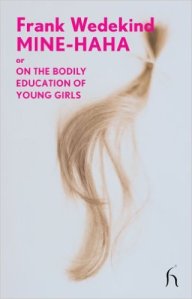Frank Wedekind was a German-American writer, best known as a dramatist for plays such as Spring Awakening and the ‘Lulu’ plays, Earth Spirit and Pandora’s Box. It would be fair to say that his work, and his life, was very much taken up with sex. Writing towards the end of the nineteenth century his work can be seen as a rejection of what he regarded as an artificial, socially-constructed morality, which was anyway hypocritical. Spring Awakening (as the title suggests) explores the developing sexuality of teenagers at odds with a society which wishes to keep them ignorant and to associate desire with guilt. In the course its three acts, the play features masturbation, rape, sado-masochism and homosexuality. Mine-Haha, you may be pleased (or disappointed) to hear is less explicit, but the same tensions between desire and morality lie at its heart.
The novella is presented as an autobiographical manuscript given to the author by an elderly woman, Helene Engel, a few weeks before she commits suicide. It tells of her unusual upbringing, with no mention of parents, and with the focus very much, as the subtitle suggests, on ‘The Bodily Education of Young Girls’. Initially in mixed sex groups, this education involves learning how to move: running, skipping, walking. All the girls are dressed in the same way, in short white dresses:
“We had to gather up our dresses and clasp them in our hands firmly over our hips. Then we set off marching so slowly that between each step one could have run once round the house.”
This sets the tone for much of what is described in the novella: activities which are superficially innocent (the white dresses are clearly designed to suggest purity), especially to the participants, but which have a sexual or erotic undertone.
Once the narrator, known as Hidalla at this point, reaches a certain age (though still pre-pubescent) the sexes are separated and she sent to an all-girls school; taken for her bed naked she is placed inside a box and delivered to her new life. This ceremony represents both a death and rebirth, but with the suggestion of the body as an object to be packaged and posted. In this new institution her education continues much as before:
“From the very first day they put me to task and made me walk on my hands. Two of the girls held me up by the legs. My hair hung down to the ground, the dress fell from my belt down to the back of my neck.”
The school is funded by shows which the girls put on in a theatre when they are older (from around the age of twelve). Wedekind describes one of these shows in some detail; s with the activities we have already witnessed they are performed in innocence by the girls but intended to give erotic pleasure to the audience, from whom the dancers are kept quite separate:
“A grille from floor to ceiling separated us from the tiers of seats, which rose on all sides as in an amphitheatre, and it was dark beyond that so we could not even discern whether the seats were occupied or not.”
After this period in their life is over, the girls are put on an underground train and reunited with the boys; Hidalla’s hand is taken by a particular boy and she is led through a crowd of people as the story ends.
As translator Philip Ward points out in his introduction, “Mine-Haha can be read a dozen ways.” It’s tempting to think of it as a lurid fantasy, or perhaps a misogynistic fable. What makes these readings less plausible, however, is the sheer lack of sexual content. Though the body is fetishized throughout, physical contact, even among the girls, is frowned upon. Similarly, though Hidalla finds the bodies of others attractive, even as she enters her teenage years there is no sense of desire. Instead we have a dystopia disguised as a utopia. The girls’ lives may appear idealised – the white dresses, the beautiful surroundings of the school, the focus on music and dance – but in fact they are confined, kept away from the opposite sex, and kept ignorant about many aspects of live, including sex. In other words, their life is not dissimilar to a (middle class) girl of that time.
Mine-Haha is certainly an unusual, and at times unsettling, tale. Despite its rather measured style, it still has the potential to shock. A recent film adaptation (Innocence directed by Lucile Hadžihalilović in 2004) suggests that the uncomfortable mirror it holds up to our view of female sexuality is not entirely dated.


November 9, 2016 at 11:34 am |
I’ve read this years ago and remember loving it. All of Wedekind actually. I had no idea it has been translated.
November 9, 2016 at 7:41 pm |
It’s a fairly recent translation – 2010 published by Hesperus. This is my first encounter with his work.
November 10, 2016 at 4:18 am |
I should try to find this. Kee-raz-ee.
November 13, 2016 at 4:27 pm |
It comes with two bonus short stories as well!
November 11, 2016 at 4:08 pm |
Wedekind’s narrative gaze sounds rather Humbert Humbert-esque. There does seem to be a fair bit of underage girls with their skirts around their waists (either held up or falling down as they walk on their hands). Lack of express sexual content doesn’t mean it can’t be a fantasy, particularly when the subject of the potential fantasy is underage girls.
Obviously none of that rules out many other interpretations, but happily for my TBR I’m not tempted by this one.
November 13, 2016 at 4:24 pm |
I’m not sure I would be recommending it to anyone anyway!
Wedekind certainly seems to have had an interests in sex and in shocking his audience. Particularly important here is the innocence of the girls with regard to actions which could be seen as sexual, their lack of awareness of the intent behind the gaze of the audience in the theatre, and by extension, the writer / reader. That Wedekind continually advocated more sexual awareness makes me think that it’s not part of the fantasy.
October 25, 2017 at 10:44 am |
[…] 1 Ullmann: The Country Road 1 Vanderbeke: The Mussel Feast 1 Wedekind: Lulu Plays 1 Mine-Haha 1 Wolf: Medea 1 They Divided the Sky 1 Zweig: A Game of Chess 1 2 A Summer Novella 1 Amok 1 […]